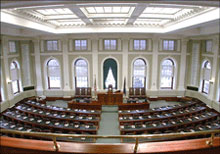 Severin Beliveau was acting like he owned the place.
Severin Beliveau was acting like he owned the place.
It was a warm late-January day in the small but dignified chamber of the Legal and Veterans Affairs Committee in the State House. Beliveau, who is Democratic Governor John Baldacci’s campaign super-fundraiser and Maine’s über-lobbyist, was leading the charge of gray-suited corporate warriors against two lobbyist-disclosure bills.
“Mr. Democrat” got up to speak at the public hearing afterslouching in a chair with his feet up on a wastebasket.
“I’ve been in this business for 35 years,” he said, pounding the podium. “This is overreacting. You all know who we are.”
As if to prove his point, he addressed Senator Elizabeth Mitchell, the Vassalboro Democrat, by her nickname, “Libby.”
The breach of decorum was too much for Democratic Representative John Patrick of Rumford, the House committee chairman.
“I think you intended to say ‘Senator Mitchell,’ didn’t you?” he asked Beliveau.
“I didn’t intend to,” Beliveau replied haughtily, “but I will.”
Earlier, another corporate lobbyist, Charles Soltan, had addressed the committee with similar hauteur: “As far as I know, you don’t let us vote yet. But I’d love to. It would save us a lot of time.”
The many lobbyists and their lawmaker friends laughed.
And so it went at the hearing on LD 1727, which would extend reporting requirements to lobbyists of executive branch officials, and LD 1822, which calls for the Commission on Governmental Ethics and Election Practices to require more information from lobbyists and make it available on its Web site (www.maine.gov/ethics/). Lobbyists in the State House outnumber legislators and do everything from write laws to raise political-campaign funds. Regulating lobbyists, who overwhelmingly work for moneyed interests, has long been a progressive priority.
But no one spoke in favor of these two reform bills except their sponsor, Democratic Representative Marilyn Canavan of Waterville, former director of the ethics commission, and Representative David Webster, a freshman Democrat from Freeport.
“Where are all the advocates for good government?” Canavan asked as the hearing began. “It’s distressing.”
She “couldn’t find anybody” when she had tried to contact Maine Common Cause and the League of Women Voters, she said, and “the Maine Citizen Leadership Fund had four staffers here last year, and now they’re gone.”
Representative Sean Faircloth, a Bangor Democrat, had the same complaint a month later, prior to a hearing on his lobbyist reform bill, LD 1993, which would oblige paid consultants testifying on legislation to identify themselves as such: “I keep wondering when the League of Women Voters and Common Cause are going to come and testify in favor of the public interest.”
They didn’t show for this bill, either.
“Money and politics is the name of the game,” Faircloth said in exasperation. “If people aren’t advocating on these bills, they miss what’s going on.”